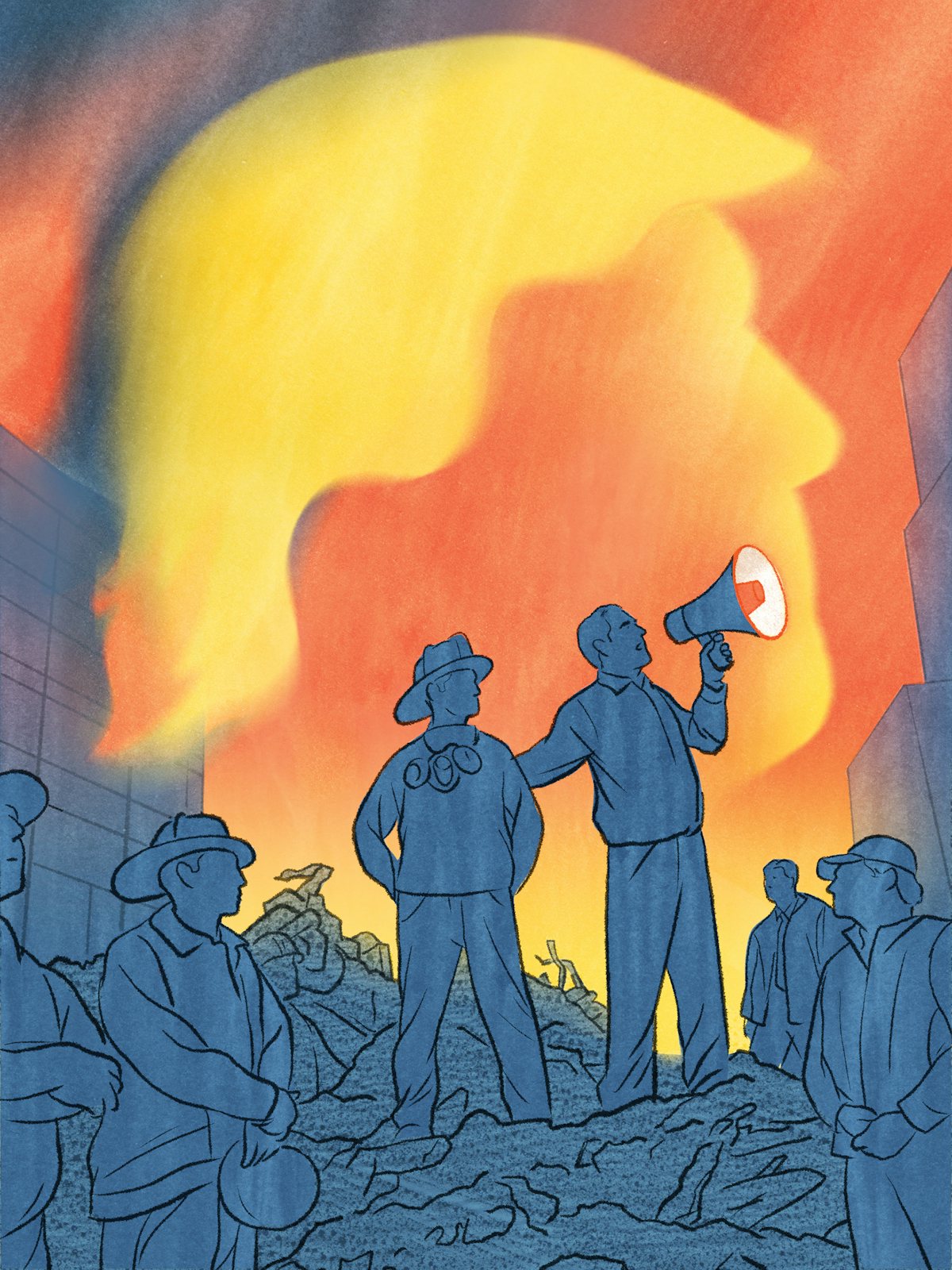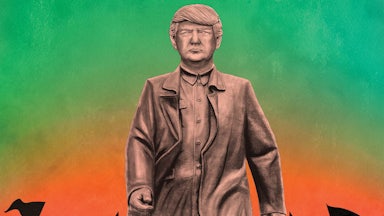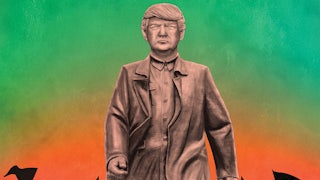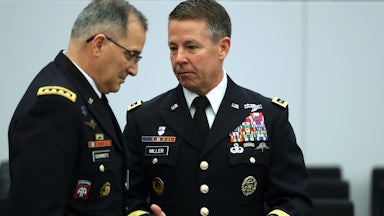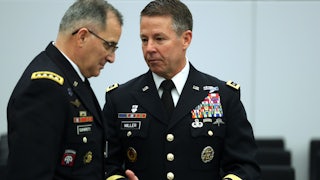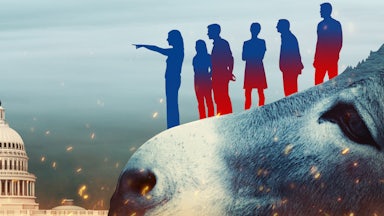On September 5, 2016, two months before the Electoral College victory of Donald Trump, an essay published under the pseudonym “Publius Decius Mus” appeared in the conservative intellectual journal the Claremont Review of Books. Aimed squarely at never-Trump conservatives, its author—later identified as Michael Anton—insisted that there was no choice but to support Trump. “A Hillary presidency will be pedal-to-the-metal on the entire Progressive-left agenda,” he wrote. To his fellow conservatives, he pleaded: “If you genuinely think things can go on with no fundamental change needed, then you have implicitly admitted that conservatism is wrong.” Like Trump, Anton saw before him a sick country. He diagnosed the disease as a political left busy dismantling everything that he thought made the country great, and a conservative intellectual apparatus that has accepted losing in a system stacked against it. The most fundamental problem, according to Anton, was that “the ceaseless importation of Third World foreigners with no tradition of, taste for, or experience in liberty means that the electorate grows more left, more Democratic, less Republican, less republican, and less traditionally American with every cycle.” Failing to support Trump courted national suicide. “2016 is the Flight 93 election,” wrote Anton, “charge the cockpit or you die.”
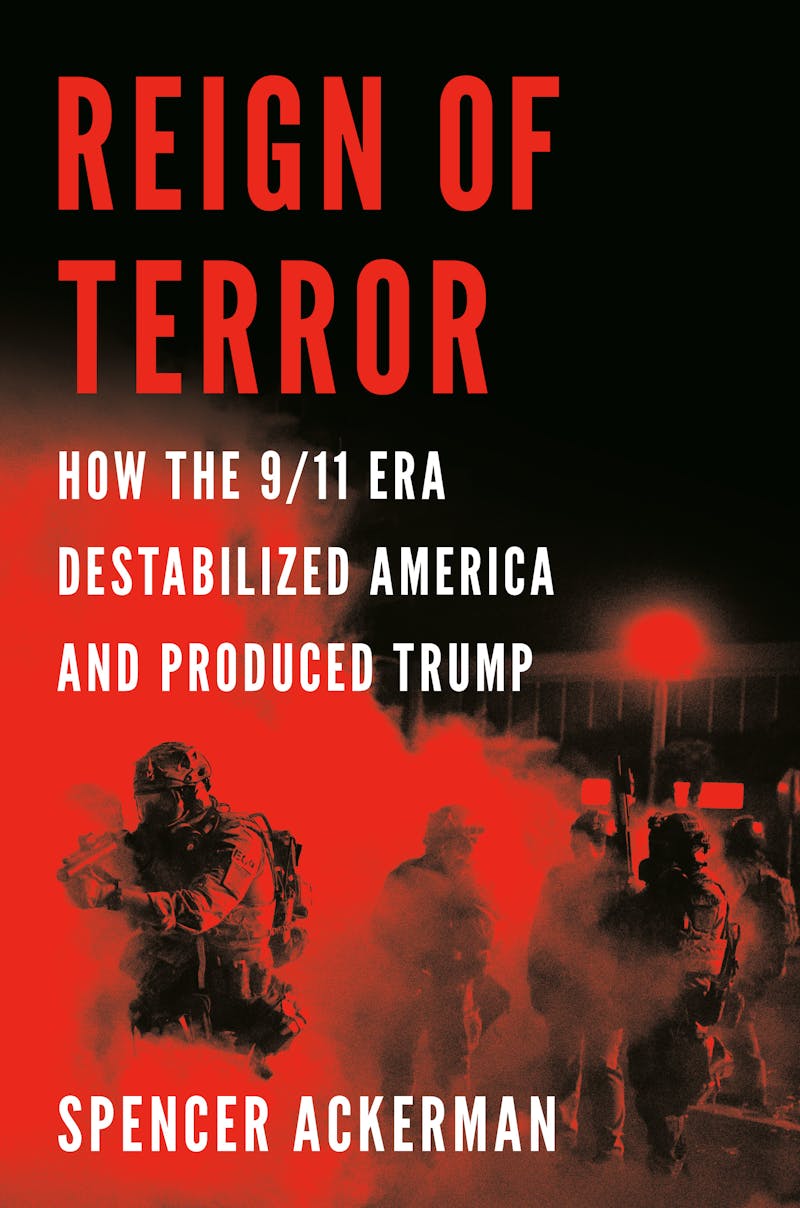
Anton’s essay demonstrates the combination of projection and paranoia that characterized the administration he would soon join. While it is consumed with fear of immigrants as the threat to the body politic and the American way of life, its title, “The Flight 93 Election,” calls back to a different threat. The attacks of September 11, 2001, are otherwise unmentioned in the essay. But the implication of the title is clear: Just as the passengers of Flight 93, realizing their hijacked plane was a part of a coordinated attack on America, tried to storm the cockpit, causing the plane to crash into a field rather than reach its intended target, so, too, was sacrifice now required to confront a civilizational threat. “You may die anyway,” writes Anton, encouragingly. “You—or the leader of your party—may make it into the cockpit and not know how to fly or land the plane. There are no guarantees. Except one: if you don’t try, death is certain.”
As it happens, it is believed that the intended target for Flight 93 was the U.S. Capitol Building. That attack on the Capitol was foiled by the passengers on the doomed plane. Some 20 years later, on January 6, 2021, the Capitol did come under attack. But it was neither the left, nor recent immigrants, nor Al Qaeda who carried it out. It was the group that Anton thought of as “traditional Americans”—a mob of private-plane passengers, white supremacists, and conspiracy theorists for Trump—who sought, with the approval of the president, to overturn the results of a democratic election.
These two attacks on the Capitol, separated by approximately two decades, bookend Spencer Ackerman’s Reign of Terror. But what connects them? In the wake of Trump’s election, two principal explanations for his victory emerged: one centered on the divisions and wounds of race, another on the divisions and wounds of economic inequality. Ackerman offers a third explanation—or perhaps, more precisely, a way of tying various threads together. “The War on Terror,” he writes, “was by no means the only factor enabling Trump’s rise.” But it created ways for the other factors, such as racism, to find powerful forms of expression: “It revitalized the most barbarous currents in American history, gave them renewed purpose, and set them on the march, an army in search of its general.” It has also misled us. The threat to democracy comes not from terrorism but the apparatus of counterterrorism, at the level of the state and at the level of politics. The book argues powerfully that the open-ended War on Terror has been an exceptionalist fantasy, a bipartisan failure, and a profound risk to American democracy. Whether ending the War on Terror would be enough to diminish that threat now is another matter.
Ackerman began his professional career as an intern at The New Republic in 2002. Like the magazine of that era, he initially favored the war in Iraq. But he grew disillusioned quickly; by 2004, he was arguing for immediate U.S. withdrawal. And though TNR published his case, he was clearly diverging from the editorial position of the magazine. He started a blog called Too Hot for TNR, and told a colleague that it “wouldn’t be the worst thing in the world” to get fired “for being too left-wing.” Something like that happened in 2006, and he has been writing for other outlets—from The American Prospect to The Guardian to The Daily Beast—ever since.
The result of nearly two decades of reporting on the wars from a skeptical position, Reign of Terror is attuned to their costs. Ackerman has done much traditional reporting: embedding with the U.S. military, visiting Guantánamo, talking to sources on background. But like many in his generation of bloggers, he has mixed reporting with analysis and opinion. That Reign of Terror begins with three epigraphs—one from James Madison, one from the French poet Alfred de Vigny, and one (“Sick of living in America / Sick of mass hysteria”) from the punk band Ceremony—communicates his tone and sensibility.
The book begins not in New York City but in northeastern Oklahoma, in a small community called Elohim City overseen by a racist, polygamist, Christian supremacist leader named Robert G. Millar. In 1994, Timothy McVeigh visited, sharing the compound residents’ white supremacist thinking and anti-government views. A former soldier, McVeigh planned and carried out the bombing at the federal building in Oklahoma City on April 19, 1995. Many responded to that attack by leaping to blame Muslims. When the investigation revealed McVeigh’s responsibility, he was given representation, tried, and sentenced to death. Meanwhile, Congress passed a law making it easier to convict people of ties to terrorist groups outside the United States.
The contrast between the response to McVeigh’s act of terrorism—at that point the deadliest attack of its type in U.S. history—and 9/11, was remarkable. The attacks on the World Trade Center and the Pentagon unleashed a new era, reorienting American society and government. Hate crimes against Muslims (and Sikhs assumed incorrectly to be Muslims) skyrocketed. Conspiracies seeking to explain the attack proliferated. Law enforcement agencies began operating with the assumption of guilt-by-religious-association. Fourteen thousand Arabs and Muslims who were registered for a database kept by Attorney General John Ashcroft were subject to deportation proceedings.
It is impossible to look back at the Bush administration’s actions and not see the groundwork for Trumpism. Like Trump’s “Muslim ban” 15 years later, Ashcroft’s database targeted Muslims, but threw in North Koreans for cover. Deliberate acts of cruelty were the hallmark of the Bush administration’s program of torture, carried out by the CIA at black sites around the world and at Guantánamo Bay. Nor was that the only place that abetted lawbreaking among government officials. It is hard to square Stellar Wind—the massive, secret, and warrantless collection of Americans’ communications data—with the Constitution, though the Bush administration’s lawyers tried. When CIA Director George Tenet told Bush and Vice President Dick Cheney that the National Security Agency director would go to jail for the way he was intercepting and using data, Cheney said he would post bail.
It is true that Bush decided to frame the conflict as a “Global War on Terror” rather than a conflict with Islam, but he acted in ways that virtually guaranteed that this would be a distinction without a difference. Bush proffered a “with-us-or-against-us” mentality and used the attack on 9/11 to build a case for war on Iraq based on distortions and selective intelligence. The public believed it: In 2003, 69 percent of Americans thought there was likely a connection between Saddam Hussein and the attack. The weak case for U.S. intervention was bolstered for many Americans by the sense that the United States was engaged in a civilizational conflict. And even if Bush did not, many conservative churches did blame Islam for 9/11; Bush’s use of the word “evil” helped supply a comfortable framework for conservative Christians. When the invasion of Iraq proved catastrophic, conservatives were furious not with Bush but with Iraqis themselves, who were not playing the part assigned to them by their narrative of American heroism and innocence. “I’d like to see one other thing in Iraq,” wrote Fred Barnes in The Weekly Standard in 2004, “an outbreak of gratitude for the greatest act of benevolence one country has ever done for another.” Tucker Carlson was more colorful: Iraqis, he thought, who “don’t use toilet paper or forks … can just shut the fuck up and obey.”
Republicans turned what they thought was their war on evil against their domestic opponents. When Vietnam veteran John Kerry ran against Bush in 2004, he portrayed himself as a good soldier and steward of the post-9/11 environment. A murky group calling itself the “Swift Boat Veterans for Truth” emerged to challenge Kerry’s account of his service. “Its purpose,” writes Ackerman, coining a phrase that brilliantly captures the logic of the attack, “was to un-Troop its targets, excluding them from the public veneration that the post-9/11 era afforded to military service.” Meanwhile, the new vocabulary of “Homeland Security” linked terrorism to immigration. In Bush’s second term, Immigration and Customs Enforcement raids increased in pace and intensity. One 2007 sweep through a factory making vests and backpacks for the military resulted in 361 arrests. “It’s inhumane to take a mother away from her children,” one man said that night. “She’s not a criminal.”
When Barack Obama was the Democratic presidential candidate in 2008, he faced a right wing that was well-prepared and eager to associate him with foreign enemies. His candidacy united the War on Terror and the culture war in the minds of the Republican base. In a time before widespread adoption of social media, email chains proliferated suggesting that Obama was a secret Muslim. Sarah Palin, as the nominee for vice president, told crowds that Obama “pals around with terrorists.” People shouted at rallies for his head. When Obama was elected in the midst of economic collapse, anti-Black racism, Islamophobia, and xenophobia all came together in Tea Party activism. Tea partiers, encouraged by Fox News, could mobilize panic around a Muslim cultural center in Manhattan, calling it the “Ground Zero Mosque” and its moderate cleric a terrorist sympathizer. The ultimate expression of this framing of Obama as an un-American outsider was “birtherism,” the charge that Obama had faked his place of birth and therefore was not truly American. It was an absurd and obvious lie that was encouraged and repeated most notably by Donald Trump. It helped Trump establish a political persona and a connection to the voters who would once have been described as “fringe” but had become the core demographic of the Republican base.
If Reign of Terror builds toward an explanation of Trump by showing how the post-9/11 environment turbocharged the darkest elements in the American right, Ackerman also argues that Democrats share responsibility. Fearful of being labeled unpatriotic at a time of intense patriotism, they partnered with Bush in the days and months after 9/11. Only one senator voted against the USA PATRIOT Act. Most Democrats voted to authorize the war in Iraq. Obama’s stated opposition to the war in 2002 probably provided him with the margin of victory over Hillary Clinton, who had supported it, in the 2008 primary. (Though after a meeting with Code Pink protesters in March 2003, Clinton had muttered to an aide, “I can’t believe I signed up for this fucking war.”) Nevertheless, in office, Obama mostly sought to build what Ackerman describes as a “sustainable” War on Terror. He sought to end the legal murk around Bush’s practices, halting authorized torture and closing secret prisons. But he increased the troop presence in Afghanistan, and expanded the use of drone strikes, linking him to the security state in ways that prevented a more thorough reckoning with what had gone wrong.
In a book largely without heroes, Ackerman commends the figures who spoke out against abuses and exposed the misdeeds of the government. These include some politicians, mostly figures on the left like Bernie Sanders, who eventually called for an end to the very concept of the War on Terror. He devotes a chapter to whistle-blowers who, from within the security state itself, revealed its wrongdoing. These include the well-known and controversial cases of Chelsea Manning, who provided diplomatic cables to WikiLeaks in 2010, and Edward Snowden, who revealed ongoing mass surveillance in 2013. Less well known is the case of Dan Jones, a Senate investigator studying the history of the CIA torture program. Jones, realizing that the CIA was underplaying the brutality, overplaying the effectiveness, and actively concealing information, smuggled documents to the Senate to ensure that investigators would not lose access to evidence of agency lies.
Many of these beats will be familiar to those who lived through them; they should be required reading for anyone too young to remember. But one aspect of the book that is both unusual and important is that Ackerman gives attention to the lives of people on the wrong end of U.S. violence, human beings who remain shockingly unfamiliar to most Americans. These include Omar Khadr, a child of Canadian Al Qaeda sympathizers who, at age 15, may have thrown a grenade that killed a U.S. soldier in Afghanistan. He was tortured in Guantánamo, hog-tied, held upside down, and his head was used to clean the floor, like a human mop. It includes Faheem Qureshi, a young man who spent 40 days in the hospital after being hit by a missile fired by a drone on the third full day of Barack Obama’s presidency.
And that brings us to Trump. Superficial readings of Trump would portray him as an opponent of the War on Terror. He claimed to have opposed the Iraq War; he insulted Bush and military families; he said he would bring troops home. But Ackerman argues that Trump’s victory in 2016 did not present a repudiation of the War on Terror. Rather, it was a product of it. By the time Trump was running for president, fears about immigration and the rise of ISIS were feeding what Ackerman describes as a “white nativist appetite for a narrative of besiegement, replacement, abandonment, and betrayal.” Ted Cruz tried to tap into these sentiments, arguing that “the front line with ISIS isn’t just in Iraq and Syria, it’s in Kennedy Airport and the Rio Grande.” But it was Trump who knew how to use the jingoism of the War on Terror to stoke grievance and offer a respite from its humiliations.
Rather than breaking with the War on Terror, Trump removed Obama-era restrictions and brought it home. He intensified bombing campaigns in Afghanistan that increased civilian casualties. Over his first two years, he launched more drone strikes than Obama had in his most intense period of their use. At home, Trump empowered ICE and Customs and Border Protection to act with special brutality: famously separating families, but also using prolonged cold and light exposure in ways that resembled the techniques of CIA torture. He treated anti-fascist activists as domestic terrorists, and when Black Lives Matter protests surged in 2020, he turned the apparatus of counterterrorism against them, too. Though there was no danger to him whatsoever, Trump spent the first Sunday of protests over the police murder of George Floyd in the bunker where Dick Cheney spent 9/11.
In the genre of books that seek to explain why we are in the mess we are in, Reign of Terror is a formidable entry. To those who want to portray Trump as wholly exceptional, and discontinuous with the recent past, the book is an essential corrective. It roots Trump in white racial grievance of long standing, and shows how militarized counterterror prepared a significant minority of Americans to turn to him to escape the indignities that, for Trump’s base, included 9/11 itself, Bush’s failures, and Obama’s existence. It is not to deny that Trump presented in some ways novel challenges to American society and government to note that if you are looking for examples of executive lawbreaking, ex cathedra mendacity, administrative incompetence, and intentional cruelty inflicted as policy, it is not necessary to reach back further than Bush.
Despite the links between the Bush and Trump administrations, many of Trump’s opponents have worked to rehabilitate Bush, by pointing to his displeasure with Trump, or to small acts of civility like passing a candy to Michelle Obama in 2018. Though Bush left office with an approval rating as low as Trump ever had, by 2018 54 percent of Democrats viewed him favorably. Similarly, Mitt Romney and Liz Cheney may have mounted principled opposition to Trump’s behavior, and become victims of a Trumpified Republican Party, but they, too, were complicit in creating the atmosphere that brought the country to this point. Seeking votes in the 2008 primary, Romney had called for a doubling of Guantánamo. For her part, Cheney co-founded a group called Keep America Safe and spread the CIA’s line that torture had made possible the killing of Osama bin Laden. Even the “adults in the room” who became so prominent on liberal MSNBC were mostly veterans of the War on Terror. In Ackerman’s view, Trump’s attacks on the “Deep State” led some liberals to overidentify with individuals who have themselves misled the public and avoided responsibility for their actions.
Ackerman’s book lands at a pivotal moment. Like many ideas once dismissed as implausibly left-wing, antiwar views now have more solid representation in politics and media. The entire Democratic field in 2020 spoke out against “endless wars,” and even Trump clashed with his more hawkish advisers like John Bolton. A critique of the “Forever Wars” and arguments in favor of a more restrained foreign policy posture for the United States have taken institutional form in the Quincy Institute, which brings together left-wing and conservative thinkers with funding from George Soros and Charles Koch. President Joe Biden plans to withdraw U.S. troops from Afghanistan on or before September 11, 2021.
These are all positive developments; bringing an end to the ill-conceived War on Terror is the right thing to do for the United States and the world. “Of all the endless costs of terrorism,” writes Ackerman cogently, “the most important is the least tallied: what fighting it has cost our democracy.” If the War on Terror brought the United States to its current democratic crisis, it might logically follow that stepping away from it now can repair the damage done. But this is far less clear. Shifts in the balance of power in the Republican Party cannot be so easily unwound, the market demand for extreme views remains strong and untethered from real problems. Democrats, for their part, still fear the political consequences of rethinking public safety, internationally and domestically.
It would be churlish to fault a book subtitled How the 9/11 Era Destabilized America and Produced Trump for making its case forcefully. But I also wonder if, when considered in broader historical terms, the War on Terror will seem like such a pivotal moment. 9/11 certainly put a pin in the balloon of 1990s triumphalism. And counterterrorism continues to shape consciousness in ways that may sometimes be hard to recognize. But there is nothing new about the United States launching destructive wars, or in the American right finding ways to demonize internal enemies in apocalyptic tones. Would a book that argued “How the Nixon era destabilized America and produced Trump” be any less plausible?
If we began the tape in the 1970s, for example, we would see the conclusion of a war interpreted as a humiliating defeat. We would see some veterans returning from Vietnam and embracing the white power militia movement. We would see Nixon’s criminal behavior in office pardoned by his successor, setting a foundation of elite impunity that remains a powerful feature of American life. We would see Congress investigating the security state’s abuses of that era’s surveillance technology. In the years that follow, we would see Newt Gingrich rise in the Republican Party on the back of a legislative strategy of total rejection of cooperation with the Democrats, and right-wing media embrace increasingly extreme positions and identities. All this, all before 9/11. In this framing of the recent past, the War on Terror made it possible to sustain a politics of fear as domestic crime rates dropped to historic lows. Important, but not era-defining in the way that it felt to those living through it.
I’m not sure that Ackerman would disagree. He states that our inability to step out of the intellectual and strategic quagmire of the War on Terror is a result of the clash between America’s position as a global hegemon and its exceptionalist concept of American innocence. “Trump brought aspects of the war home,” he writes, “but fundamentally the war was always home.” Even if political leaders are ready to put an end to the “Forever Wars” (and they may not be), economic growth elsewhere in the world virtually guarantees that the near future will see a relative decline in U.S. power.
Only time will tell if the War on Terror will become a permanent feature of our politics, or perhaps a footnote in what the United States did between Cold Wars. But it will be a painful transition if the United States tries to hang on to global dominance by abusing the power it retains, in the same way that Trump’s followers try to cling to power even as they have become the numerical minority within the United States. Seeing this danger clearly will be essential to navigating the next decades, which are likely to feature a loss of status that will be difficult for many in the United States to accept. Americans are still so powerful, and so afraid.
